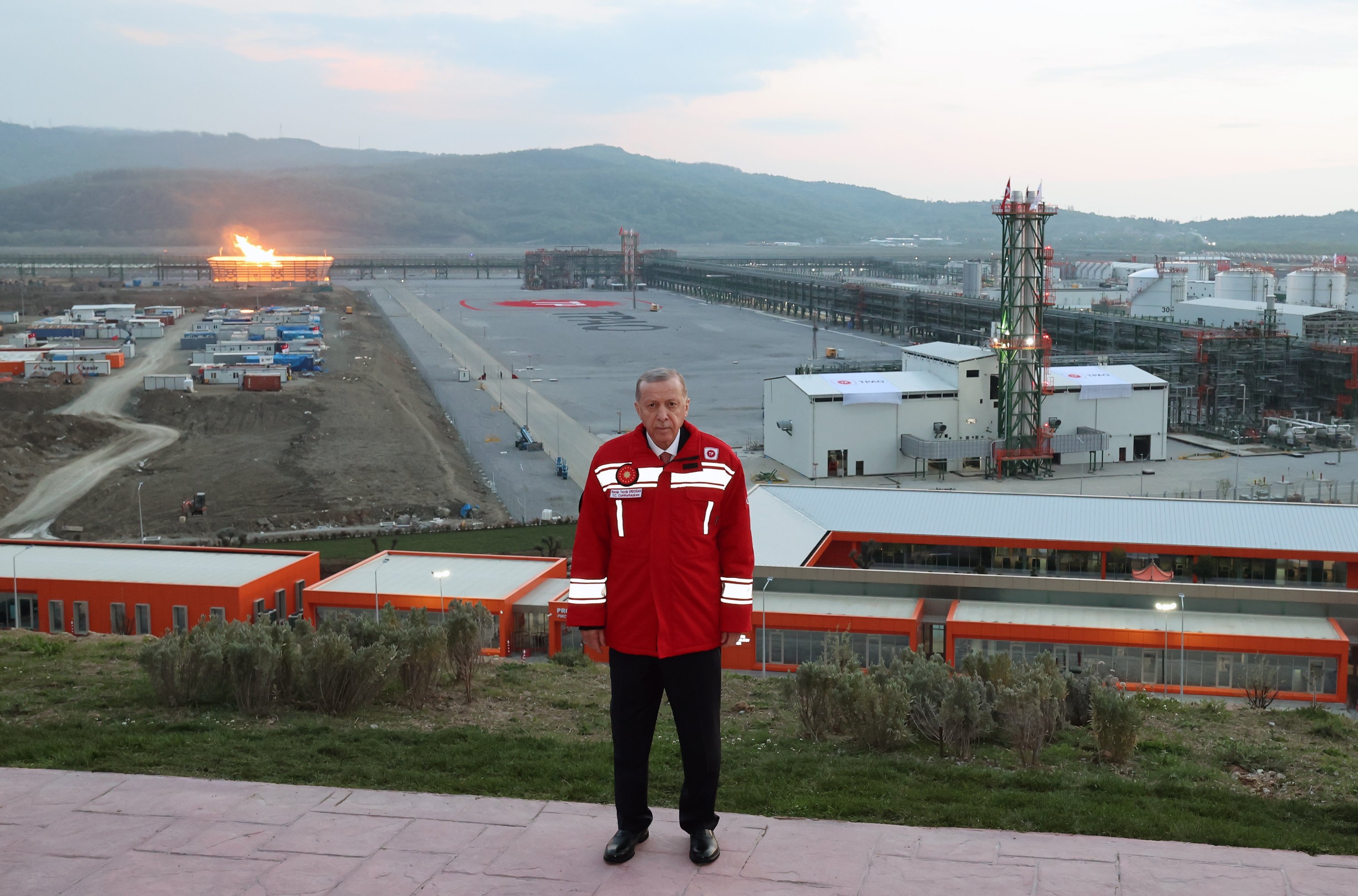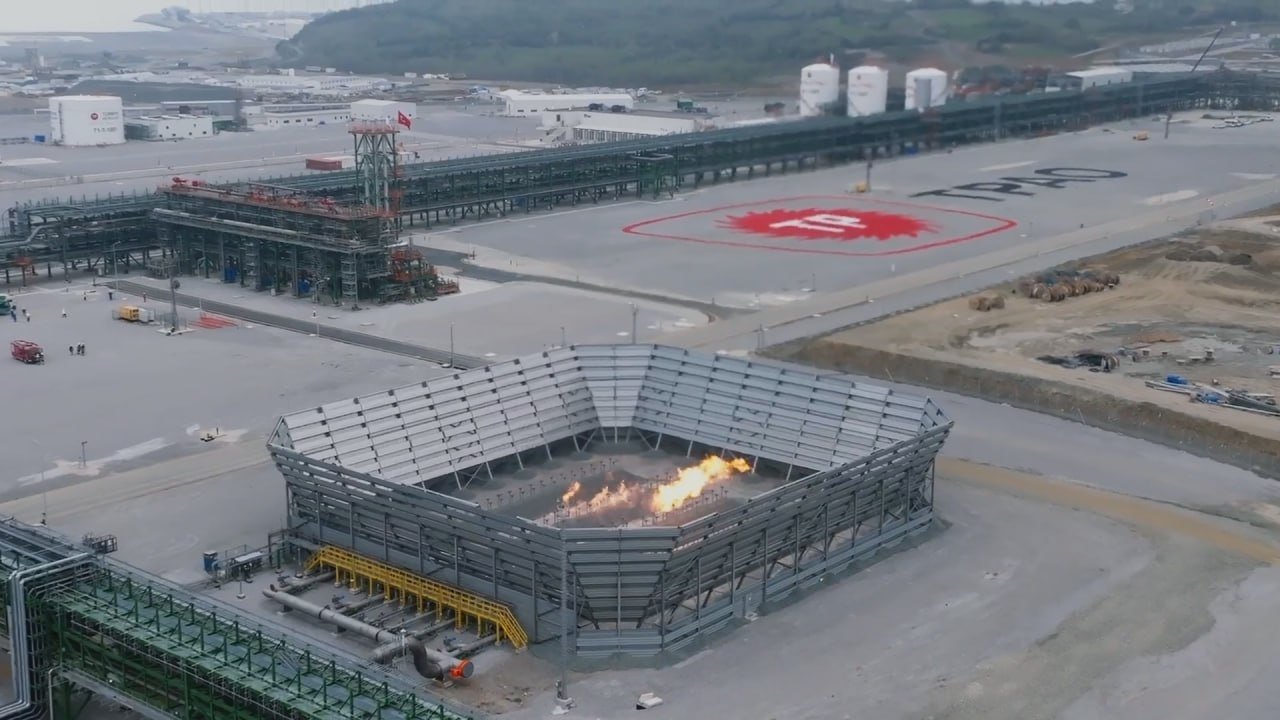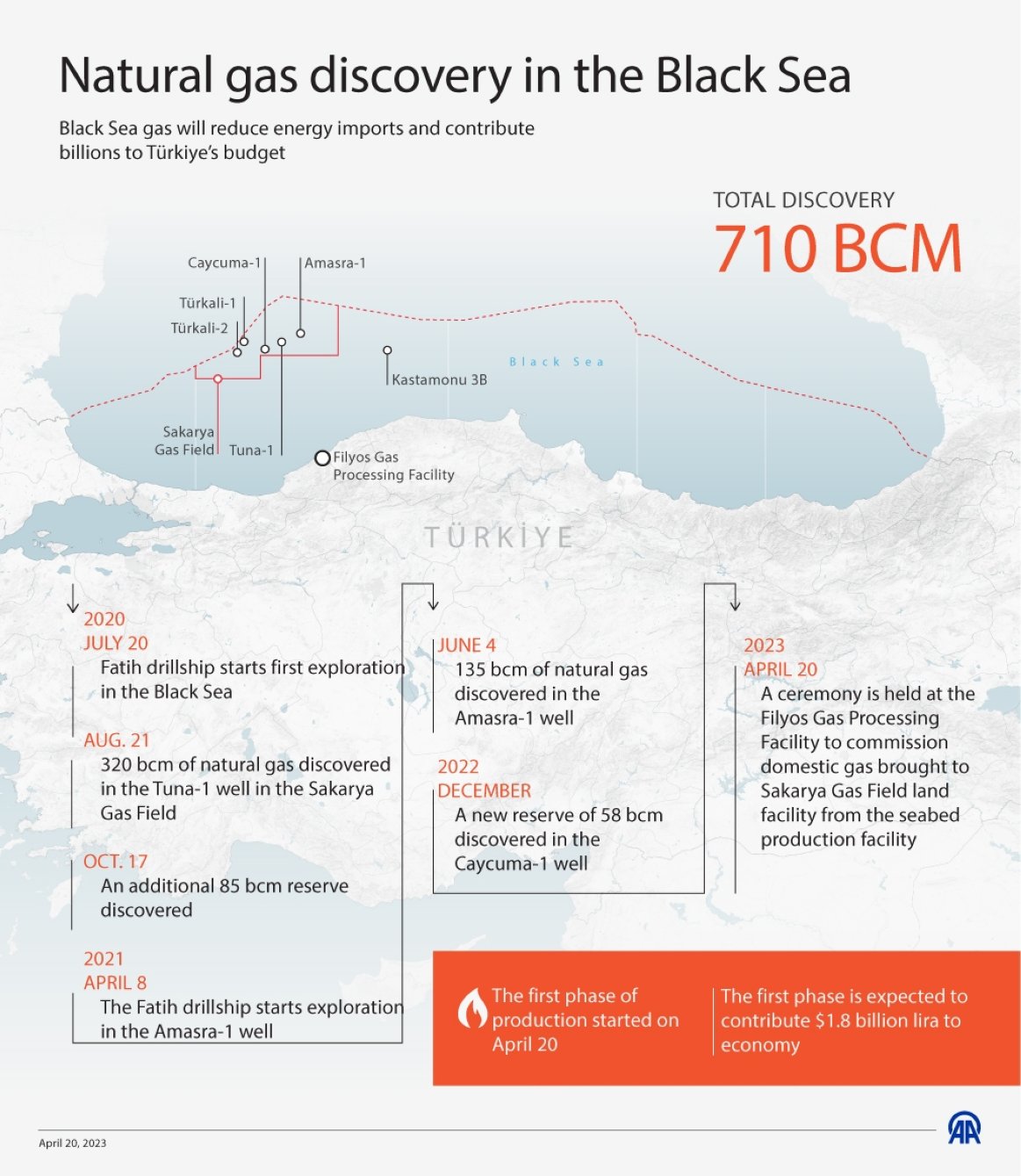Türkiye Thursday started natural gas production from a vast reserve discovered in the Black Sea, which promises to curb the country’s external dependence and cut consumer energy prices.
President Recep Tayyip Erdoğan green signaled the first delivery to an onshore plant, which will begin with 10 million cubic meters (mcm) of gas daily in the first phase.
“This is a historic milestone for Türkiye’s path to energy independence,” Erdoğan told the ceremony held in northern Zonguldak province broadcasted live on television.
Production will be increased to 40 million cubic meters of gas per day in the coming period, the president said, after other wells go into operation.
“When we reach full capacity, we will meet 30% of our country’s gas needs” from the Black Sea reserves, he said.
In August 2020, the country discovered a reserve off the coast of Zonguldak, which Erdoğan hailed as a way to wean the country off its dependence on energy imports.
Erdoğan announced that the country’s first drilling vessel Fatih had discovered 320 billion cubic meters (bcm) of gas in the Tuna-1 well in the Sakarya gas field.
The discovery went down to history as the largest gas discovery ever in Türkiye’s history, which thereafter only went on to be gradually revised upward.
In late December 2022, the reserve was eventually predicted to hold around 710 bcm of gas, the increase that Erdoğan said came mainly from the Sakarya field, where reserves are now seen at 652 bcm, and another 58 billion cubic meters found in an offshore field nearby.
According to experts, 10 million cubic meters of gas per day in the first phase would meet around 6% of Türkiye’s annual consumption, which stands at 60 billion cubic meters.
It will deliver a boost to the economy and cover a significant part of Türkiye’s energy needs, reducing its dependence on foreign sources while strengthening its hand on contracts with major gas-supplying countries.
More than 8,000 personnel on land and over 2,000 at sea have worked tirelessly in three shifts for the past two years to bring the gas onshore.
In June last year, Türkiye started the construction of an underwater pipeline connected to the seabed from the port of Filyos – around 400 kilometers (250 miles) east of Istanbul on the Black Sea coast.
Free natural gas
Meanwhile, Erdoğan Thursday also announced that natural gas used in kitchens and for hot water, equivalent to 25 cubic meters per month on average, would be provided free of charge for a year.
He also said all households would be offered a month of free natural gas for domestic consumption.
This could mean TL 30.8 billion (around $1.59 billion) in support for citizens’ budgets.
The process of extracting natural gas will proceed in stages. Some five of the 10 wells planned within the scope of the first phase will be commissioned after the ceremony on Thursday, and the remaining five wells will be commissioned at the end of September.
The second production phase is expected to start in 2026, and the third stage is scheduled to begin in 2028.
As of the second phase, all household needs in Türkiye will already be covered by domestic gas.
Satisfied buyer
Oğuzhan Akyener, head of the Türkiye Energy Strategies and Policy Research Center (TESPAM), expressed optimism about the contribution of Black Sea gas to the national economy.
Akyener noted that the initial 10 mcm of gas per day could meet 5%-6% of Türkiye’s annual consumption.
Akyener acknowledged that gas prices are dynamic and do not have a fixed mechanism.
He referred to the fluctuating prices in the Energy Stock Exchange Istanbul (EPIAŞ), which rose to as high as TL 25 per cubic meter in winter and is currently around TL 9-10.
He estimated that the first production phase would yield TL 100 million per day based on today’s average EPİAŞ spot sales price of TL 10 per cubic meter and daily production of 10 mcm.
He added that the income from the second phase could be around TL 400 million.
Maintaining that the economic value will increase with the increase in natural gas production, Akyener said: “Assuming that we produce 3.5 bcm of natural gas per year and taking the spot market prices of EPIAŞ as an average of TL 10, the contribution of the first phase gas to the economy will be approximately TL 35 billion.
Referring to the possible contributions of Black Sea gas to Türkiye in the winter months, Akyener said: “When prices increase in winter, it becomes difficult to find gas. Therefore, we buy spot natural gas at high prices from outside. But from now on, we may not have to buy spot natural gas from outside during winter.”
The discovery will strengthen Türkiye’s hand on future trade deals, putting Ankara in a much more favorable position. Akyener said: “We will approach new natural gas contracts with a satisfied buyer’s eye. You renew the contracts as they expire. By saying, ‘I already have natural gas,’ you can cut prices on new contracts.”
Russia has always been the most significant natural gas exporter to Türkiye – a country highly dependent on imports via pipelines and liquified natural gas (LNG) – followed by Azerbaijan and Iran.
The country also met its energy needs with LNG purchases from various countries, including Algeria, Nigeria, Qatar, the U.S., Trinidad and Tobago and Norway.
In recent years, several positive steps have been taken to diversify the country’s supply channels and improve deals with trading partners. With a focus on infrastructure and LNG investments in gas storage and transmission, Türkiye had already succeeded in reducing its share of oil-based pipeline gas contracts.
The country has started to reap the benefits of those investments this year, as it has benefited from lower LNG prices brought about by the pandemic by storing the cheaper purchases.
The discovery
The first steps of the natural gas exploration project were taken following the statements of then-Energy and Natural Resources Minister Berat Albayrak at the National Energy and Mining Policy Meeting held on April 6, 2017.
“For the first time in our history, I hope we will dig at least two wells in the Black Sea and two in the Mediterranean every year with the exploration drilling ship we will purchase this year,” he said.
Then on June 9, 2017, Albayrak visited the Barbaros Hayreddin Paşa seismic vessel, saying: “If we say Türkiye is now a great power, we have to be with our engineers, ships and exploration drilling platforms in this field as well. Hopefully, we will take important steps as a result of this.”
On July 9, 2017, at the World Oil Congress, Albayrak said: “We have focused on oil and natural gas activities in our seas on the axis of exploration and production activities. Our seismic research continues intensively in the Mediterranean and Black Seas.”
“There is now a Turkish Petroleum (TPAO) that will continue our drilling works at full speed in 2018 in the Mediterranean with our drilling ship, which we will add to our inventory before the end of this year,” he said at the 7th International Natural Gas Congress on Nov. 3, 2017.
Source: Daily Sabah





